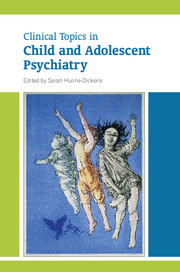Book contents
- Frontmatter
- Contents
- List of tables
- List of boxes
- List of figures
- List of contributors
- Preface
- 1 Child psychiatry and the people who have shaped it
- 2 Fabrication and induction of illness in children
- 3 Personality disorders as disorganisation of attachment and affect regulation
- 4 Post-traumatic stress disorder and attachment: possible links with borderline personality disorder
- 5 Management of antisocial behaviour in childhood
- 6 Pharmacology for attention-deficit hyperactivity disorder, Tourette syndrome and autism spectrum disorder
- 7 Pharmacology for anxiety and obsessive–compulsive disorders, affective disorders and schizophrenia
- 8 Pharmacological management of core and comorbid symptoms in autism spectrum disorder
- 9 Pharmacological treatment of depression and bipolar disorder
- 10 Cognitive–behavioural therapy with children, young people and families: from individual to systemic therapy
- 11 Anxiety disorders
- 12 Somatising: clinical presentations and aetiological factors
- 13 Somatising: management and outcomes
- 14 Evaluating psychological treatments for children with autism
- 15 Attention-deficit hyperactivity disorder: assessment and treatment
- 16 Schizophrenia
- 17 Tourette syndrome
- 18 Sleep disorders
- 19 Self-harm in adolescents
- 20 Adolescent substance misuse: an update on behaviours and treatments
- 21 Eating disorders
- 22 Gender dysphoria in young people
- 23 The psychiatry of children aged 0–4
- Index
13 - Somatising: management and outcomes
Published online by Cambridge University Press: 02 January 2018
- Frontmatter
- Contents
- List of tables
- List of boxes
- List of figures
- List of contributors
- Preface
- 1 Child psychiatry and the people who have shaped it
- 2 Fabrication and induction of illness in children
- 3 Personality disorders as disorganisation of attachment and affect regulation
- 4 Post-traumatic stress disorder and attachment: possible links with borderline personality disorder
- 5 Management of antisocial behaviour in childhood
- 6 Pharmacology for attention-deficit hyperactivity disorder, Tourette syndrome and autism spectrum disorder
- 7 Pharmacology for anxiety and obsessive–compulsive disorders, affective disorders and schizophrenia
- 8 Pharmacological management of core and comorbid symptoms in autism spectrum disorder
- 9 Pharmacological treatment of depression and bipolar disorder
- 10 Cognitive–behavioural therapy with children, young people and families: from individual to systemic therapy
- 11 Anxiety disorders
- 12 Somatising: clinical presentations and aetiological factors
- 13 Somatising: management and outcomes
- 14 Evaluating psychological treatments for children with autism
- 15 Attention-deficit hyperactivity disorder: assessment and treatment
- 16 Schizophrenia
- 17 Tourette syndrome
- 18 Sleep disorders
- 19 Self-harm in adolescents
- 20 Adolescent substance misuse: an update on behaviours and treatments
- 21 Eating disorders
- 22 Gender dysphoria in young people
- 23 The psychiatry of children aged 0–4
- Index
Summary
In this chapter we outline the treatment of children and adolescents with somatising conditions. The major diagnostic groups for these conditions (according to ICD-10; World Health Organization, 1992), in approximate descending order of prevalence, are adjustment, dissociative (conversion), somatoform and factitious disorders, and neurasthenia (chronic fatigue syndrome). The aetiology and clinical presentations of these disorders are discussed in Chapter 12, together with descriptions of the corresponding disorders in DSM-5 (American Psychiatric Association, 2013). Despite work in the past decade on the treatment of recurrent abdominal pain (Campo et al, 2004; Walker et al, 2006) and chronic fatigue (Rangel et al, 2000a; Garralda & Chalder, 2005), somatising conditions remain an area in which there is little systematic treatment research. Epidemiological studies give us a broad description of outcomes (Lieb et al, 2000; Kozlowska, 2001; Chalder et al, 2003; Ani et al, 2013) and there are many useful clinical accounts of the management of these disorders (Wright et al, 2000; Kozlowska et al, 2007; Fiertag et al, 2012).
Which professional should manage somatising disorders?
The decision about the appropriate clinician to manage a somatising disorder should depend on who has the skills to maximise the chances of recovery to normal functioning. This depends on the severity of the presentation, its impact on the young person's current functioning and how long symptoms have lasted.
Paediatricians and general practitioners (GPs) undertake the management of many adjustment, dissociative (conversion) and factitious disorders, and mild relapses of any somatising conditions. The presentations they manage are most likely to be of single or multiple physical symptoms (abdominal pain, joint pains, headaches), fatigue associated with obvious stresses of any kind, recent-onset losses of function, and unexplained symptoms after a clear physical illness. Their management forms a routine part of primary care and paediatric practice. Key elements of management in paediatric and primary care are listed in Box 13.1.
Box 13.1 Key elements of initial management by primary care or paediatric professionals
• Take a good history, within a biopsychosocial framework, which identifies stresses and recent life events
• Provide clear reassurance about negative physical findings when the appropriate investigations have been completed
• Examine family beliefs about illness in order to prepare for the step of encouraging a return to a normal lifestyle
• Provide a model to explain psychosomatic symptoms to the family
- Type
- Chapter
- Information
- Clinical Topics in Child and Adolescent Psychiatry , pp. 201 - 217Publisher: Royal College of PsychiatristsPrint publication year: 2014



